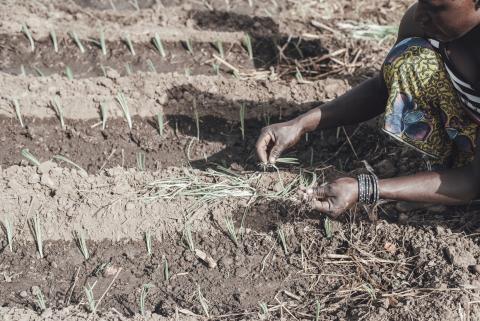Integrating climate and nutrition
This is a summary of the following report: GAIN (2023) Accelerating action and opening opportunities: A closer integration of climate and nutrition 2023 I-CAN baseline assessment. https://www.gainhealth.org/resources/reports-and-publications/accelerating-action-and-opening-opportunities-closer-integration-climate-and-nutrition
Ahead of the UN Climate Change Conference (COP 28) in the United Arab Emirates, this report assesses the current integration of climate and nutrition and opportunities to act more cohesively.
The Initiative on Climate Action and Nutrition (I-CAN) is a multi-stakeholder, multi-sectoral global flagship programme formally launched at COP 27. For this baseline assessment, I-CAN selected 20 indicators. Using 13 of these indicators, this analysis uses four ‘levels’ to assess the degree of integration between climate and nutrition, from no integration (level 1) to strong integration (level 4). This four-level approach provides a straightforward way to present over 1,500 data points across indicators, which would be too large to outline individually. Despite the wealth of data to penetrate, there are some key takeaways that can be lifted from this report.
Integration within national plans is limited
Nationally Determined Contributions1 (NDCs) showed the lowest levels of climate-nutrition integration and just 2% scored in the highest level of integration (level 4). National Adaptation Plans2 (NAPs) fared slightly better (16%) and National Nutrition Plans were more closely integrated with climate (28%) - but all are clearly lacking. The report found that 60% of NDCs achieved ‘level 1’, which indicates that there is no intention to connect climate and nutrition. This may reflect that, under the 2015 Paris Agreement, country commitments have focused on emissions reduction and therefore more heavily on issues such as land use, pollution, and energy.
Data and knowledge transfer remain poor
In the 2022 Global Nutrition Report3, 95% of stakeholder commitments that are monitored do not consider climate or sustainability in any way. In total, 38% of data and knowledge portals had no links (level 1) between climate and nutrition. However, recent Intergovernmental Panel on Climate Change reports did score ‘level 4’, indicating that there were many in-depth considerations of nutrition within them. This could offer a blueprint for other actors working in the capacity building, data, and knowledge transfer areas.
A paucity of policy data
Data on the number of food-based dietary guidelines that include climate considerations and the number of countries factoring climate into food procurement decisions was generally limited. The authors therefore noted that this area may fare better than the analysis implies. Yet, 54% of food-based dietary guidelines and 83% of food procurement policies scored ‘level 1’ - which is again disappointing.
Investment is poor
From 2021 to 2022, just 3% of Green Climate Fund grants included interventions addressing nutrition interventions (level 4). Fewer than 1% of projects (2018-2022) included both climate and nutrition themes.
Summary
Climate change and nutrition are inextricably linked, but this report shines a spotlight on the lack of progress that governments and actors are making on integration. In many cases, across multiple policy areas, there is an intention to act. However, this intention is yet to result in coherent, robust action – apart from in a few outlier countries.
1 NDCs are non-binding national climate mitigation plans that contribute to achieving the global goals set out in the Paris Agreement. Broadly speaking, these plans aim to limit and/or reduce damage to the ecosystem.
2 NAPs aim to identify medium- and long-term adaptation needs (e.g., developing flood defences in low-lying areas) for countries, with the process outlined by the 2010 ‘Cancun Agreements’. Broadly speaking, these plans aim to modify settings to be more resilient to existing climate challenges.


